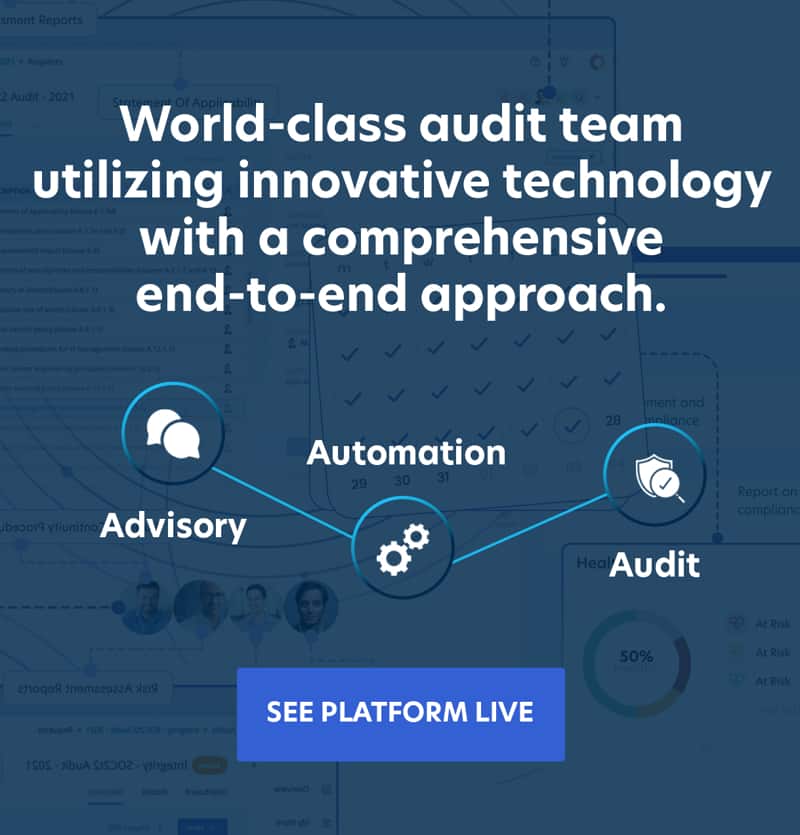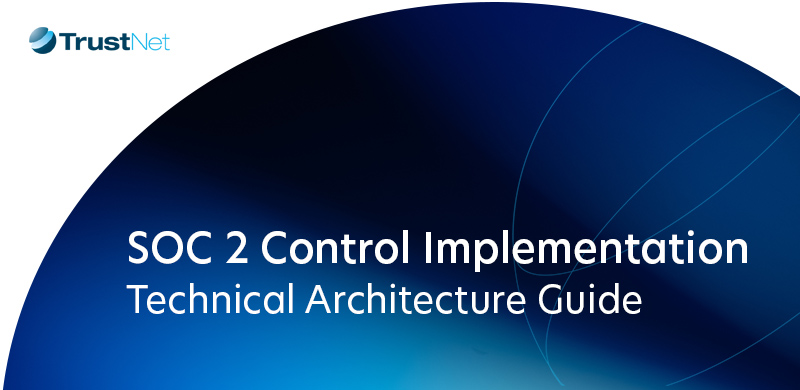Blog SOC 2 vs SOC 3
SOC 2 vs SOC 3

Navigating the labyrinth of data security standards can seem bewildering. One crucial fact to grasp is that SOC 2 and SOC 3 are both audit standards devised by AICPA, yet they differ in their level of detail and application.
Understanding SOC 2 and SOC 3
SOC 2, established by the American Institute of Certified Public Accountants (AICPA), offers an extensive review of a service organization’s non-financial reporting controls related to security, availability, processing integrity, confidentiality, and privacy.
On the other hand, SOC 3 is a summary version of the detailed SOC 2 report and can be shared with the general public. Both types set vital standards for managing customer data in cloud-based software technology and SaaS platforms.
These assessments are carried out by independent certified public accountants following strict auditing standards, ensuring effective internal control over financial reporting.
SOC 2 is a reporting standard the American Institute of Certified Public Accountants (AICPA) sets. It revolves around system controls and provides detailed summaries of their procedures and test results.
The audience for these reports is specific, as they contain restricted-use information. A SOC 2 audit typically lasts several weeks to months and requires execution by independent CPAs trained and certified in the field.

Definition of SOC 3
SOC 3 is an audit framework elaborated as part of the Service Organizations Controls (SOC) developed by the American Institute of Certified Public Accountants (AICPA). It verifies that a service organization’s system controls operate effectively and abide by trust services criteria.
Unlike other SOC reports, particularly SOC 2, which offers granular details, SOC 3 focuses on the five Trust Service Criteria: security, availability, processing integrity, confidentiality, and privacy.
Interestingly, though less detailed than its counterparts, such as SOC 2 or SOC 1 for financial reporting purposes, alluring aspects encompass its accessibility and usability.
The publicly accessible report gives it visibility, serving companies who seek to demonstrate their compliance status openly for marketing advantage without revealing crucial specifics about procedures or test results like in comprehensive reports.
To acquire a SOC 3 certification, one should go through the required steps in a SOC 2 examination, hence inherently linked with each other.
The Role and Importance of SOC Reports
SOC Reports have become essential in our increasingly digital world. With cyber threats rising, service providers operating in cloud-based software technology must prove their commitment to robust cybersecurity practices.
This is where SOC reports come into play — they confirm that an organization’s system controls are reliable and effective, validating their ability to secure customer data.
Independent certified public accountants conduct these audits, providing added credibility for businesses when dealing with clients or partners who demand high data security assurance.
As such, organizations that fail to provide the necessary SOC reports may lose the trust of potential stakeholders or even face legal complications.
Who can perform a SOC Audit?
Only certified professionals have the authority to perform a SOC Audit. Specifically, this task is assigned to independent Certified Public Accountants (CPAs) who maintain their credentials via the American Institute of Certified Public Accountants (AICPA).
Their role necessitates extensive training and proven expertise in analyzing internal controls over financial reporting and other critical data security and processing integrity areas.
Proficient CPAs must lead these audits to ensure comprehensive exploration into a company’s practices, safeguarding businesses from potential risks or breaches while improving trust levels with clients when securely handling sensitive information.

How SOC 2 and SOC 3 Work
SOC 2 sets criteria for managing customer data based on five “trust service principles” – security, availability, processing integrity, confidentiality, and privacy. Meanwhile, SOC 3 also applies these same principles but in a more general sense; it provides an overview of the systems used to process users’ data and the controls they have in place.
SOC 2 and SOC 3 require regular auditing by independent Certified Public Accountants to ensure ongoing compliance with these standards.
Process of SOC 2
The SOC 2 audit process is meticulously defined by the American Institute of Certified Public Accountants (AICPA). Here are the key steps involved:
1. The first step is the selection of trust services criteria relevant to the organization’s offered services.
2. Next, the service organization develops a control system that meets the selected trust service criteria.
3. Dry runs or readiness assessments follow to identify and correct potentially weak areas before the formal audit.
4. An independent certified public accountant then examines policies, procedures, and systems for satisfying selected Trust Service Criteria.
5. The auditors generate either a Type I report detailing if the controls are suitable and adequately placed or a Type II report evaluating if such controls were adequate over time.
6. Also prepared are SOC 2 reports providing detailed insights about control activities, test results, and auditor opinions.
Process of SOC 3
The SOC 3 examination unfolds through a prescriptive procedure.
1. under the American Institute of Certified Public Accountants (AICPA) regulations, engage an independent public accountant.
2. Perform a preliminary review to identify potential system controls and procedures that need adjustment.
3. Carry out a thorough audit according to trust services criteria.
4. The auditor writes and provides the SOC 3 report, including test results, data compliance specifics, and confirmation of cybersecurity measures in place.
5. The service organization can proudly display its SOC 3 seal on their website or in other materials for general use.

SOC 2 vs SOC 3: Key Differences Explained
In this section, we delve into comparing and contrasting SOC 2 and SOC 3, outlining how their purpose and scope vary, the level of report accessibility for each, and clarifying the difference in detail provided by both types of reports.
Differences in the purpose and scope
SOC 2 is designed to provide an organization’s management and its customers with a detailed understanding of the system controls concerning security, availability, processing integrity, confidentiality, and privacy.
In contrast, SOC 3 focuses on the same five Trust Service Criteria but in a less detailed format that can be widely distributed to users or the public.
While the SOC 2 report illuminates how data is processed and protects customer information via selected criteria based on risk assessment specific to each service organization’s operations, SOC 3 aims to demonstrate an overall assurance about an effective control environment for general use.
Thus, both serve valuable yet different roles based on the level of detail their intended audience requires.
Differences in report accessibility
SOC 2 reports target a specific circle of users with extensive knowledge about the systems and controls service organizations use. To get access, stakeholders usually sign an NDA agreement due to sensitive information found within these reports, therefore, they are labeled as restricted-use documents.
In contrast, SOC 3 reports accommodate a broader audience as they’re publicly accessible without needing to sign NDAs or any formal agreements. Often located on the company’s website or provided upon request without barriers compared to their SOC 2 counterparts, it offers greater accessibility regarding report distribution and allowed use cases, making it a standard marketing tool for cloud-based software technology companies like SaaS businesses.
Differences in the level of detail provided
SOC 2 and SOC 3 reports diverge significantly regarding the depth of information offered. A SOC 2 report provides extensive specifics about a company’s system controls, procedures, and test results.
These details allow for a deeper understanding of where potential security weak points may exist. In contrast, SOC 3 reports deliver high-level assurance without divulging sensitive or proprietary business processes and systems data, making them suitable for public distribution.
However, achieving this general-use credential does necessitate traversing each step embodied in an intensive SOC 2 examination process first.

Benefits of SOC 2 and SOC 3 Compliance
SOC 2 and SOC 3 compliance provides essential benefits like enhancing a vendor management program through reliable risk assessments, increased client trust, and carving a competitive advantage in Software as a Service (SaaS) and Data Center Marketing by showcasing stringent security measures.
Vendor Management Program benefits
Vendor Management Programs gain significant advantages from SOC 2 and SOC 3 compliance. Their detailed information on system controls, procedures, and test results proves instrumental for risk assessment in these programs.
They provide invaluable insights that aid a business to critically analyze both current and potential vendors by offering a robust frame of reference.
SOC 3 reports invite another advantage – public distribution. This allows service providers to showcase their commitment to secure systems to vendors, building trust through transparency.
The audit process involved is comprehensive, covering aspects like security, availability, processing integrity, confidentiality, and privacy, further bolsters vendor management programs’ efficacy by identifying potential risks.
SaaS and Data Center Marketing benefits
Achieving SOC 2 and SOC 3 compliance gives SaaS companies and data centers a competitive edge. These certifications enhance their credibility, demonstrating to prospective clients that they prioritize the security and privacy of consumer information.
These compliances can significantly boost consumer trust levels, especially for service providers working with sensitive data. In over-saturated markets like cloud-based software technology, such added certainties can tilt the client’s decisions in favor of certified providers.
Furthermore, marketing with an accredited emphasis on stringent security measures paints a proactive image of handling potential cyber threats and implementing controls effectively, making them favorable choices for businesses concerned about data protection integrity.
Conclusion
Understanding the nuances between SOC 2 and SOC 3 is crucial for companies looking to uphold standard data security measures. Gaining compliance not only demonstrates a robust commitment to safeguarding information but also improves business standing among peers.
Talk to an expert today.




